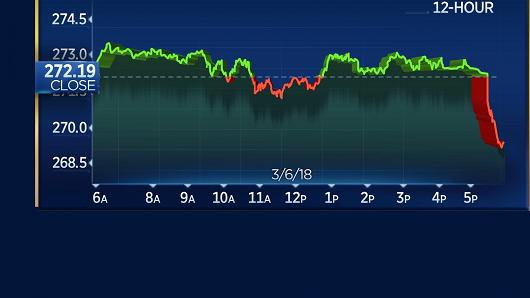
- The world is watching Russia for its reaction to Western missile strikes that were carried out on its ally Syria.
- The U.S. is expected to announce Monday more sanctions on Russia because of its support for Syrian President Bashar Assad.
- Analysts predict Moscow’s retaliation could be fairly limited despite rapidly escalating tensions.
The world is watching Russia for its reaction to Western missile strikes that were carried out on its ally Syria, but analysts predict Moscow’s retaliation could be fairly limited despite rapidly escalating tensions.
The U.S. is expected to announce Monday more sanctions on Russia because of its support for Syrian President Bashar Assad. This after the U.S., U.K. and France conducted a coordinated missile strike targeting the suspected chemical weapons infrastructure of the Syrian government Saturday.
Russia has signaled that it would respond to sanctions with retaliatory measures against the U.S. On Monday, Russia’s Deputy Foreign Minister Sergei Ryabkov said that Moscow “will not delay in adopting legislation against U.S. sanctions,” news agency RIA said, adding that Washington was demonstrating “open economic aggression.”
Russian lawmakers are reportedly considering legislation to give the Kremlin powers to ban or restrict a list of U.S. imports, Reuters reported Monday. Russia has signaled that it could look to target U.S. companies that use Russian products or rely on Russian industries, such as its nuclear energy and aerospace sectors.
Western airstrikes followed a suspected chemical weapons attack in the town of Douma on April 7 in which at least 70 people are believed to have died and which the U.S. and its Western allies have blamed on Assad. The Syrian regime denies involvement in the attack and Russia called it a “fabrication,” however.
Experts believe that Russia’s reaction should be muted, for now, with one analyst noting that the “likelihood of a direct, military response to the strikes from Russia is very low.”
“Despite the threats from Russia’s ambassador to Lebanon Alexander Zasypkin that Russia would target the platforms from which the missiles were fired, Moscow is fully aware that such an attack would not only constitute a massive and dangerous escalation,” Daragh Mcdowell, principle Russia analyst at Verisk Maplecroft, said in a note to CNBC on Sunday.
“It would be virtually certain to fail given the relative strengths of coalition and Russian assets in theater,” McDowell added, noting that for the moment it seems that Russia’s response will be “contained to statements condemning the attacks, public anger, but very little else.”
“Because the strikes did not hit Russian assets, and do not appear to have significantly undermined the Assad regime, there is no material reason to go further than that. Nevertheless, the poor state of East-West relations overall, and displeasure in the Kremlin with the strike may push Russia to seek asymmetrical means of retaliation. These kinds of actions are difficult to predict by their very nature, and Russia is unlikely to telegraph its intentions,” he said.
More sanctions and possible ‘chaos’
U.S. Treasury Secretary Steven Mnuchin is expected to announce new sanctions against Russia later Monday. The move was signaled by Nikki Haley, the U.S. ambassador to the United Nations, who said during an interview on CBS’ “Face the Nation” program Sunday that the decision was due to the Kremlin’s continued support of Assad.
The sanctions will impact companies which deal with equipment related to Assad and the use of chemical weapons.
Since the announcement, Russian assets have come under pressure with the MOEX index opening down 1.3 percent and the ruble 0.9 percent lower against the dollar at 62.92. Shares of Russian companies Rusal and Sberbank also fell sharply at the open Monday morning.
Russia’s strongman leader Putin warned of “chaos” in international affairs if there were more airstrikes, which he said violated the United Nations charter and were an “act of aggression.” Putin made the comments in a phone call with Iranian President Hassan Rouhani on Sunday.
According to a statement from the Kremlin, both presidents agreed that the missile strike had damaged the chances of political resolution to the ongoing Syrian civil war.
Shia-dominant Iran also supports Assad amid a battle for political and religious influence in the Middle East, while its rival, the Sunni-dominant Saudi Arabia, and the Arab League of regional powers support Assad’s opponents.
Iran and Russia have little excuse to retaliate with military action for now, one analyst noted, given the strikes had avoided Russian and Iranian assets in the country.
“I would say that most of that is largely verbal rhetoric at the moment, I don’t think we’re likely to see any tit-for-tat retaliation from Russia or Iran,” Andrew Freeman, associate analyst for MENA at Control Risks, told CNBC Monday.
“The U.S., U.K. and France didn’t target Russian or Iranian assets in Syria and they made a deliberate effort to not do that. So one of the factors that could provoke a future escalation is whether we see strikes broadening again and Russian and Iranian targets getting damaged,” he said.












